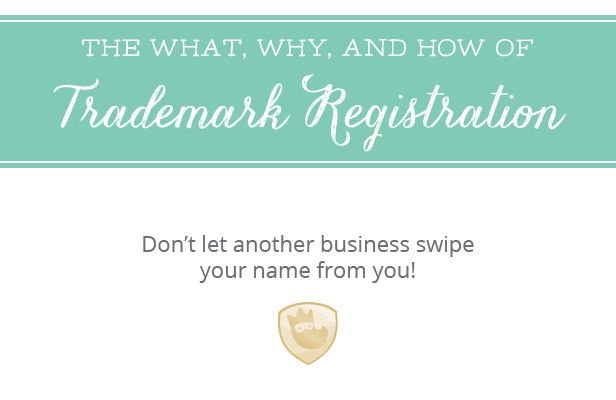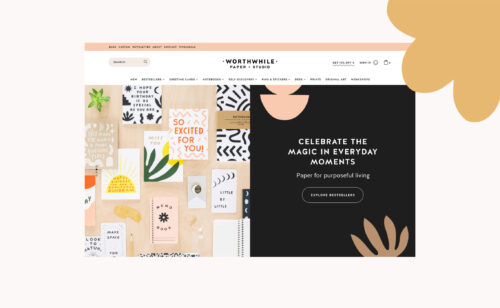
I recently had our business name trademarked through The Juniper Law Firm, and loved how simple it was. No wading through piles of paperwork, no confusing terminology, and reasonably priced. I was impressed with their process, and I’m glad to say that we’re now offering trademarking services to our clients through Juniper Law.
Over the years, I’ve seen many businesses come knock at our door with names that conflict with existing businesses (in fact, sometimes I am surprised to hear from a new client who’s using the same name as a past client!). One time we started a logo project, then the client got a Cease & Desist letter forcing them to stop using their business name, and we had to put on the brakes, help her come up with a new name, and begin the logo work again, for additional cost. No fun.
I always thought it would be nice to have a way to help people choose a great business name (which we can do), and then trademark it, to be sure that they won’t get an ugly letter from someone’s attorney down the road.
Ben from Juniper Law was kind enough to break down the facts about trademarks. Continue reading to learn more about what trademarks are, how your business can benefit from them, and how to go about registering yours.
THE WHAT, WHY, AND HOW OF TRADEMARK REGISTRATION
Historically, the greatest contributor to a company’s value was its physical assets. Not anymore. Today, the greatest contributor, by far, to a company’s value is its intangible assets, and “[t]he single largest source of intangible value in a company is its trademark.” David Haigh, founder of Brand Finance, a brand valuation consultancy.
A company’s reputation for excellence is the result of years of work and often very large investment. And because consumers will make their purchasing decisions based on your reputation versus that of your competitors, once your company has built a reputation for excellence, you will do everything you can to help consumers distinguish between your products and those of your competitors. Anything that could potentially confuse the minds of consumers about whether your products are coming from you or your competitor will cost you sales, and the competitor will benefit from your hard work in building your brand and reputation.
A trademark is any word, phrase, symbol, or device (or any combination thereof) that you use to identify and distinguish your products or services from those sold by others. (See the examples below). A trademark is what you use to tell consumers, “I made this product. You’ve had a great experience with other products of mine, so don’t risk a bad experience by experimenting with other brands. Stick with me and you’ll be treated right.”
In addition to trademarks, there are service marks, certification marks, trade dress, collective marks, and more. But for the sake of simplicity, all these marks are often referred to using the umbrella term “trademarks.” I will do the same throughout this article.
WHY REGISTER MY TRADEMARK?
What’s all this about registering your trademark? Well, without registering your trademark you have rights, but they are limited and more difficult and expensive to enforce. The benefits of registering your trademark include, among others, the following:
- Priority use of your trademark nationwide, as opposed to in a limited geographic region;
- Availability of greater damages if someone infringes your trademark (up to 3x more);
- Collecting attorney fees and court costs from an infringer in certain cases, making enforcing your trademark affordable;
- Greater ability to capitalize on and monetize the goodwill your business develops with consumers; and
- Reduced likelihood of your trademark being infringed in the first place.
There are two primary reasons for enforcing your trademark against infringers: (1) infringers poach potential customers, thus benefiting from your brand while likely doing damage to your reputation in the process, and 2) if you don’t enforce your trademark rights the law may take them away from you.
WHAT CAN BE REGISTERED?
There are, of course, limitations as to what can be registered as a trademark. For example, a trademark cannot be functional. In other words, a trademark cannot be something that actually makes your product work better than that of your competitor’s. It can only be used to distinguish your products as coming from you, and no one else.
The following are examples of different “devices” being used as a trademark:
| Word: | Microsoft® |
| Phrase: | Just do it® |
| Logo: | The Golden Arches: |
| Sound: | The NBC triple-chime |
| Color: | The contrasting red soles of Christian Louboutin designed shoes |
| Video: | The Bad Robot® clip at the end of all J.J. Abrams’ productions |
| Packaging: | The unique shape of the Coca-Cola glass bottles |
| Uniforms: | The uniforms of the restaurant IN-N-OUT’s employees |
| Business Layout: | The layout as well as “look and feel” of an Apple store. |
Obviously words and logos are the most common, but any combination of the above devices or any others you may come up with for your business can potentially be a trademark.
But before you settle on a trademark you want to use, be sure to have professional trademark research done. This research will help you determine the availability of your trademark for registration and its likely strength in the marketplace. If you don’t have the research completed you run the risk of spending time and money on a trademark that you will have to change later – new trademark registration, website, marketing material, url, and anything else your trademark is used for.
HOW DO I REGISTER MY TRADEMARK?
Traditionally, there have only been two ways to register your trademark: hire an attorney or do it yourself. Hiring an attorney is expensive and they typically take a long time to get the work done. Doing it yourself is cheap initially, but may lead to mistakes that could cause you to be sued or have only limited rights in your trademark.
Today there is an alternative. The Juniper Law Firm is an online service provider that allows businesses to register their trademarks affordably, quickly, and with confidence that it is done right. Juniper Law’s business model is based on the fact that a lot of what attorneys charge you thousands to have done is technically not “legal work,” and doesn’t need to be performed by lawyers charging an arm and a leg.
So Juniper Law picks out the non-legal work and, through the use of trained trademark professionals, modern technology, and proprietary systems and processes, completes that work at a fraction of the cost of hiring and much more quickly than an attorney. Then, the small portions of the services that are “legal work” are referred out to licensed trademark attorneys with whom Juniper Law has negotiated rock-bottom prices for its clients.
The end result is that businesses now have somewhere to go to receive a fair price for quick and professional trademark services.
Ben Pollock is a trademark attorney and a co-founder of The Juniper Law Firm. Thanks, Ben!
Would you like to see if your business name can be trademarked? It pretty much could not be easier. Just email us today, and we’ll get you some info and pricing.
A Newsletter That Goes Beyond Shopify 101
It’s easy to find beginner info about ecommerce online. If you’re past that? Subscribe to our newsletter for advanced strategies and need-to-know info for established shops. You'll get:
- Weekly tips to help you market and sell your products
- Updates when there is news that may impact your site
- Round ups of interesting links and info for brands
- Invites to our live trainings and webinars
- Instant access to our past emails
Browse Posts
A Newsletter That Goes Beyond Shopify 101
It’s easy to find beginner info about ecommerce online. If you’re past that? Subscribe to our newsletter for advanced strategies and need-to-know info for established shops.
Learn how the top shops grow:
"*" indicates required fields
1 thought on “The What, Why, and How of Trademark Registration”
Leave a Comment
Related Posts
Let's take your online shop to the next level
The Shopify websites we design have a reputation for substantial improvements to ecommerce conversion rates and online sales. Let's talk!
 Grab my guide to the 10 main ways to grow traffic and optimize to boost sales.
Grab my guide to the 10 main ways to grow traffic and optimize to boost sales.



I am totally going to do this – it’s been on my must-do list for years! When you guys say you offer trademark services, do you just recommend us to this site or do you help with some of the leg work, too?